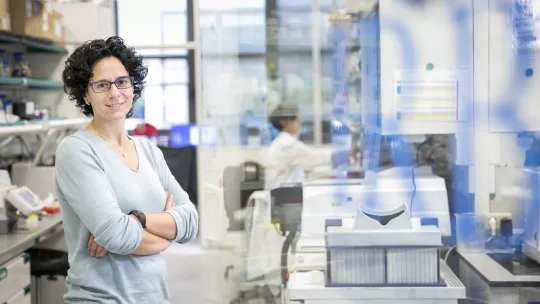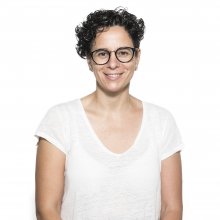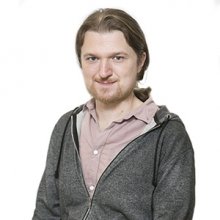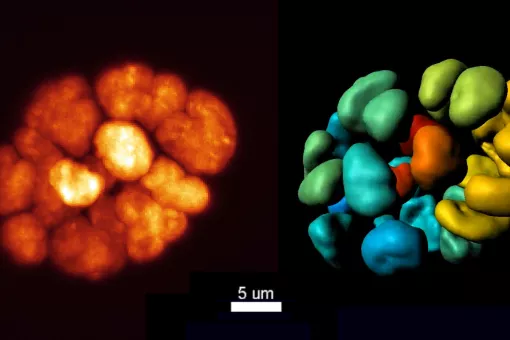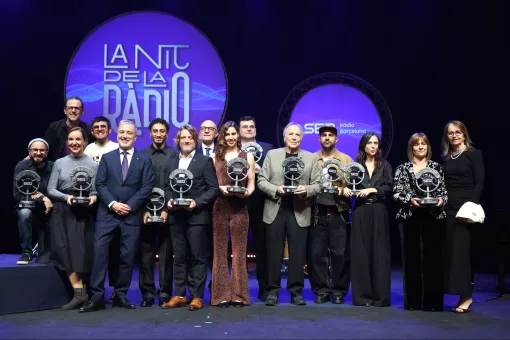Images
As of November, Núria López-Bigas, winner of the 2016 Banco Sabadell Foundation Prize for Biomedical Research, will join IRB Barcelona to continue her research on cancer using computational biology.
The Institute has also recruited Croatian scientist Fran Supek, who will launch his laboratory in 2017.
Biologist and ICREA Research Professor Núria López-Bigas (Monistrol de Montserrat, 1975) will join the Institute for Research in Biomedicine (IRB Barcelona) in November as a new Group Leader, after 10 years of leading a laboratory at the Pompeu Fabra University. Her group develops computational models to identify the genetic alterations that cause tumours to form. López-Bigas is the recent recipient of the Banco Sabadell Prize, an award that pays tribute to the quality and impact of her work. “I am going from one great place to another. It's gratifying to know that I can do research at the highest level without having to go elsewhere in the world to do it,” she says.
Among the advantages of her move to IRB Barcelona, López-Bigas includes the fact that she will be "surrounded by several other world-class groups in cancer research.” She will lead an interdisciplinary team of 14 that includes engineers, biologists, physicians and mathematicians. Their work is carried out through computational analysis, where they implement and execute algorithms to study the genomes of tumours. At IRB Barcelona, she will complement the group's computational research with an experimental laboratory. "We're particularly excited to put lab coats on again. The opportunity to validate the results we obtain in silico in the lab is an integral part of the projects we are planning," she explains.
Núria López-Bigas' research focuses on three main areas. The first is the search for mechanisms that allow mutations to accumulate in tumour genomes. The second is the identification of the genetic mutations that are key to the appearance of a tumour. "It's like searching for a needle in a haystack," she says. "A single tumour can have thousands of mutations, but we're interested in those that allow the cancer to progress." Identifying mutation drivers, of which each patient may only have 3 or 4, allows us to understand the biology that determines the appearance and progression of the cancer at a molecular level.
The third line of research uses all this information to interpret the genome of a patient's tumour, with the ultimate goal of finding opportunities for therapies. "In our lab, we carry out different types of research, from basic science, motivated by the curiosity to understand how cells function, to applied research, with the hope of bringing about direct benefits for patients," says López-Bigas.
López-Bigas is the recipient of a 5-year grant from the European Research Council (ERC), she belongs to a European consortium within the Horizon2020 programme, she holds a Plan Nacional grant the Spanish Ministry of Economy and Competitivity/FEDER funds, and receives support from the Spanish Cancer Association (AECC) and from the TV3 La Marató Foundation.
Núria López-Bigas' "Biomedical Genomics" laboratory brings the number of research groups at IRB Barcelona to 23, a number which will grow again in March 2017 with the arrival of Fran Supek (Zagreb, Croatia, 1981), another researcher in the bioinformatics and genomics of cancer, currently a postdoctal fellow at the Centre for Genomic Regulation (CRG).
Fran Supek holds a Bachelor's and PhD degrees in Molecular Biology from the Faculty of Sciences and Mathematics from the University of Zagreb (Croatia). He arrived in Barcelona in 2010 to take up a position as a postdoctoral fellow at the CRG. He studies the genomes of human tumours in the group of Ben Lehner, which analyzes the genomic signatures that play a role in tumour generation, as well as in the origin of mutations themselves. Supek's research has produced 29 scientific publications, on 18 of which he is first or corresponding author, appearing in journals such as Cell (2014), Nature (2015) and Nature Genetics (2016). He is the inventor of a patent, and participated in the creation of the spin-off company BioZyne in 2004.
His scientific objectives at IRB Barcelona will be to unravel the mechanisms that underlie different mutational processes at play in the human genome, the consequences that these mutations have in the development of cancer, and the therapeutic potential that they represent.
“While we can easily recognize the mutational signatures produced by, for example, cigarette smoke in lung cancer and UV light in melanoma, analyses of cancer genomes suggest there are many other factors causing mutations in our cells. In many cases, we don’t yet know exactly what causes a certain kind of mutation in the DNA. Some of them result from failures in the processes that the cancer cells use to repair their DNA, thereby causing the cancer to mutate faster and to become more aggressive. However, the failed DNA repair is also a weak spot of the tumour, which could be used to destroy it, while sparing the healthy cells.”
Supek's future laboratory will used cutting-edge artifical intelligence methods for cancer genome analysis in order to understand what causes mutations in human DNA and to detect tumour vulnerabilities. "The scientific environment that IRB Barcelona offers is ideal for my research. I hope that my research will add to the scientific excellence at IRB Barcelona, and complement the Institute's other lines of biomedical research."
The recruitment of Supek is a clear demonstration of IRB Barcelona's commitment to recruiting young talent with potential for excellence, and to offering leadership opportunities to young scientists.
About IRB Barcelona
The Institute for Research in Biomedicine (IRB Barcelona) pursues a society free of disease. To this end, it conducts multidisciplinary research of excellence to cure cancer and other diseases linked to ageing. It establishes technology transfer agreements with the pharmaceutical industry and major hospitals to bring research results closer to society, and organises a range of science outreach activities to engage the public in an open dialogue. IRB Barcelona is an international centre that hosts 400 researchers and more than 30 nationalities. Recognised as a Severo Ochoa Centre of Excellence since 2011, IRB Barcelona is a CERCA centre and member of the Barcelona Institute of Science and Technology (BIST).

